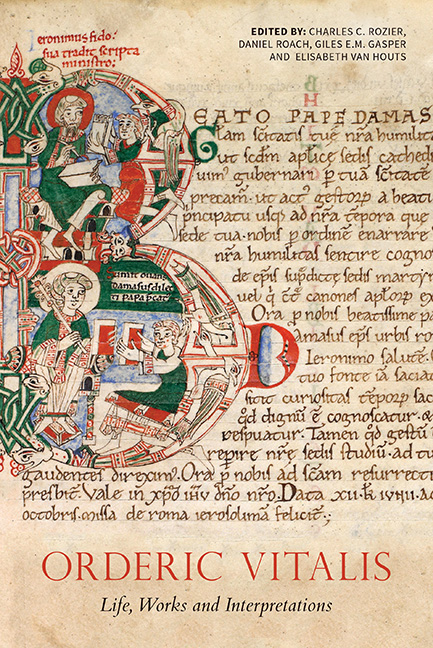Book contents
- Frontmatter
- Dedication
- Contents
- List of Illustrations
- Acknowledgements
- List of Abbreviations
- Chronology of the Lives of Odelerius and his Son Orderic Vitalis
- Composition of the Historia ecclesiastica
- Introduction: Interpreting Orderic Vitalis
- Orderic and his Father, Odelerius
- Following the Master's Lead: The Script of Orderic Vitalis and the Discovery of a New Manuscript (Rouen, BM, 540)
- Orderic Vitalis as Librarian and Cantor of Saint-Évroul
- Saint-Évroul and Southern Italy in Orderic's Historia ecclesiastica
- Orderic and English
- Inscriptions in Orderic's Historia ecclesiastica: A Writing Technique between History and Poetry
- Reading Orderic with Charters in Mind
- Orderic Vitalis and the Cult of Saints
- Orderic's Secular Rulers and Representations of Personality and Power in the Historia ecclesiastica
- Worldly Woe and Heavenly Joy: The Tone of the Historia ecclesiastica
- Orderic Vitalis, Historical Writing and a Theology of Reckoning
- Jesus Christ, a Protagonist of Anglo-Norman History? History and Theology in Orderic Vitalis's Historia ecclesiastica
- ‘Studiosi abdita investigant’: Orderic Vitalis and the Mystical Morals of History
- Meanders, Loops, and Dead Ends: Literary Form and the Common Life in Orderic's Historia ecclesiastica
- Orderic and the Tironensians
- ‘One single letter remained in excess of all his sins …’: Orderic Vitalis and Cultural Memory
- The Reception of Orderic Vitalis in the Later Middle Ages
- Appendix 1 Archaeological Investigations at the Abbey of Saint-Évroult-Notre-Dame-des-Bois
- Appendix 2 Descriptive Catalogue of Manuscripts Featuring the Hand of Orderic Vitalis
- Select Bibliography
- List of Manuscripts Cited
- General Index
Orderic's Secular Rulers and Representations of Personality and Power in the Historia ecclesiastica
Published online by Cambridge University Press: 25 October 2017
- Frontmatter
- Dedication
- Contents
- List of Illustrations
- Acknowledgements
- List of Abbreviations
- Chronology of the Lives of Odelerius and his Son Orderic Vitalis
- Composition of the Historia ecclesiastica
- Introduction: Interpreting Orderic Vitalis
- Orderic and his Father, Odelerius
- Following the Master's Lead: The Script of Orderic Vitalis and the Discovery of a New Manuscript (Rouen, BM, 540)
- Orderic Vitalis as Librarian and Cantor of Saint-Évroul
- Saint-Évroul and Southern Italy in Orderic's Historia ecclesiastica
- Orderic and English
- Inscriptions in Orderic's Historia ecclesiastica: A Writing Technique between History and Poetry
- Reading Orderic with Charters in Mind
- Orderic Vitalis and the Cult of Saints
- Orderic's Secular Rulers and Representations of Personality and Power in the Historia ecclesiastica
- Worldly Woe and Heavenly Joy: The Tone of the Historia ecclesiastica
- Orderic Vitalis, Historical Writing and a Theology of Reckoning
- Jesus Christ, a Protagonist of Anglo-Norman History? History and Theology in Orderic Vitalis's Historia ecclesiastica
- ‘Studiosi abdita investigant’: Orderic Vitalis and the Mystical Morals of History
- Meanders, Loops, and Dead Ends: Literary Form and the Common Life in Orderic's Historia ecclesiastica
- Orderic and the Tironensians
- ‘One single letter remained in excess of all his sins …’: Orderic Vitalis and Cultural Memory
- The Reception of Orderic Vitalis in the Later Middle Ages
- Appendix 1 Archaeological Investigations at the Abbey of Saint-Évroult-Notre-Dame-des-Bois
- Appendix 2 Descriptive Catalogue of Manuscripts Featuring the Hand of Orderic Vitalis
- Select Bibliography
- List of Manuscripts Cited
- General Index
Summary
At the beginning of February 1113, King Henry I of England toured the monastery of Saint-Évroul. Orderic Vitalis noted that the visit, coinciding with Candlemas, was a joyous occasion during which Henry ‘sat for a while in the monks’ cloister, made a thorough examination of their establishment and, after noting the regularity of their monastic life, praised them warmly’. To emphasise the ties between the king and the abbey, and perhaps to prompt further generosity, the king may have been shown the precious liturgical vestments that his mother, Queen Matilda, had presented to Saint-Évroul. The queen had also provided funds for the monastic refectory. The following day, on entering the chapter-house, Henry ‘humbly asked to be admitted to their fraternity’. His request was granted and the king ordered a charter listing ‘everything that the abbey of Saint-Évroul possessed on that day’.
Later, when the document was brought to Henry at Rouen, he ‘willingly confirmed it, making a cross, and handed it to his magnates who were present to be similarly ratified with the sign of the cross’. Orderic explained that the charter had been made because the monks faced ‘greedy heirs’ seeking to recover possessions granted in alms to the abbey by their relatives. To counter these threats the monks had secured the king's confirmation of their lands, hoping that his charter would deter those wishing to challenge possession of the named properties. Those who wanted to make a claim against the monks were prohibited from doing so except in the king's court. Orderic ends his account of the king's visit by noting that Henry looked to strengthen his duchy's weak points against his enemies.
Although he does not explicitly say so, Orderic probably saw, met, and perhaps talked with the king in February 1113. Orderic was ‘of Henry's generation’, born just seven years after him. It is uncertain whether Orderic had encountered the king's father or his elder brothers, but when he wrote about contemporary rulers, it was probably with Henry I foremost in his mind. The Historia presents Henry I demonstrating qualities that medieval monks like Orderic expected in a king. He was pious and respectful of those who had entered the monastic life, and, moreover, such was his knowledge of monasticism that he was able to judge how far the monks of Saint-Évroul adhered to St Benedict's precepts.
- Type
- Chapter
- Information
- Orderic Vitalis: Life, Works and Interpretations , pp. 189 - 216Publisher: Boydell & BrewerPrint publication year: 2016



